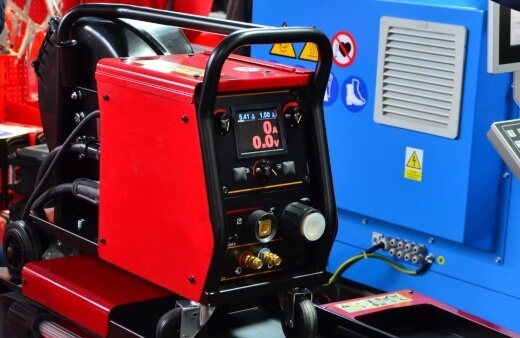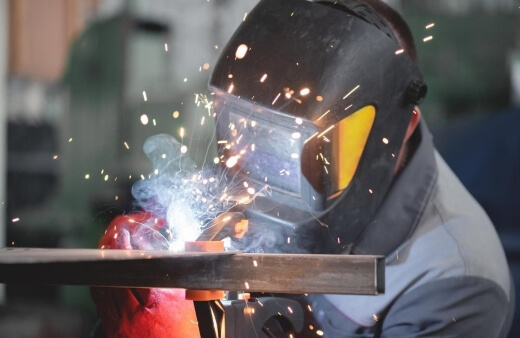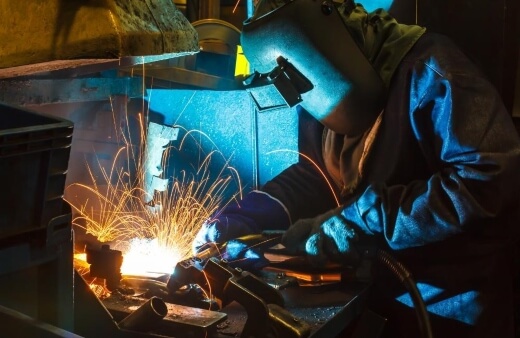MIG welding (metal inert gas) is the only realistic way to weld at home. Thanks to the all-encompassing tools, power sources, and interchangeable nozzles, MIG welders are safer than most alternatives and are affordable too.
Whether you’re a beginner, or a seasoned pro looking for an upgrade, we’ve got everything you need to guide you through buying a MIG welder, as well as reviews of the best MIG welders on the market right now.
More...
MIG Welders Buying Guide
What is a MIG Welder?

MIG welders, also known as gas metal arc welders (GMAW welders) are the most convenient tool for welding at home. They provide a steady and safe heat source to fuse metal using continuous solid wire, which is fed from the welding gun into the weld pool (the working area for fusing, where metal reaches its melting point).
MIG welders use conductive materials to create an efficient weld, where the wire itself is used as a conductor and heats itself and the metal to be fused or repaired.
Once the right heat is archived, a strong bond is achieved between the consumable wire and the metal surface(s).
When do you need a MIG welder?
MIG welders are great for any DIY welding, or welding on site, where portable tools are a key asset to any contractor’s livelihood. Metal inert gas (MIG) welders are designed for welding bonding or repairing large or thick metal sheets and rods.
Metals that can be welded using a MIG welder include cast iron, steel, copper, magnesium and nickel.
What to Look for When Buying a MIG Welder

MIG welders are varied tools, with big differences in price, power, and quality, so knowing what to look for is important. Below, we’ll talk through how to assess the performance of a MIG welder based on its specs, and clarify some of the general terms used in their sale.
Performance
The easiest way to place MIG welders apart is through voltage. It’s not a direct indication of their ability but gives a rough idea of what they are capable of.
For example, a high-end MIG welder with a 420V input voltage can weld aluminium, nickel, titanium and cast iron. Lower power models, like some budget 240V MIG welders, are only really designed for mild steel.
For most users, mild steel is the most common welding requirement though, so you can save over $1000 by choosing a low-performance model, if all you need it for is steel.
Duty cycle
The duty cycle is an indication of how long a welder can operate continuously for safe operation. Most welding jobs are quick and require short cycles, but for large jobs, or continuous use, look for MIG welders with longer duty cycles.
Different Types of MIG Welders
Most modern MIG welders can be used for gas MIG welding or gasless MIG welding. Both have advantages and disadvantages, but it’s important to check what you’ll be using, and make sure your chosen model is capable of it.
Gas MIG Welders
Gas MIG welding is safer than gasless, as the gas protects the weld pool from circulating oxygen in the room, which protects the user from chemical reactions in the flux, and creates a cleaner burn, and a better bond.


Get Your Free Guide:
Master Growing Australian Natives eBook
A Must Have Complete Guide for Every Australian Garden
Get Your Free Guide:
Master Growing Australian Natives eBook
A Must Have Complete Guide for Every Australian Garden
Gasless MIG Welders
Gas MIG welders are cheaper to run and generally faster, but they create fumes, so should only be used outdoors. Try to avoid using gasless MIG welders on tough welding surfaces like aluminium, which need a clean burn to weld sufficiently.
How to Use a MIG Welder Machine
MIG welding is generally seen as a good way to teach welding to beginners, and is accepted as a safe DIY pursuit too. Provided you’ve got the right gas, the right ventilation, and the right safety gear all you need to do is brush up on the process.

How to use a MIG welder, step-by-step:
- Set up tools and materials in a well-ventilated space (fume extractors are advised for indoor welding).
- Feed wire into the torch.
- Attach the Earth clamp to any grounded metal surface (this earths your equipment and is an essential safety measure).
- Connect the gas cylinder, or gas bottle to your MIG welder (some welders require gas cylinders, others can be used with small gas bottles, inserted into the machine. Check your machine).
- Carefully open the gas cylinder to a pressure of 1000PSI (assuming you are using an upright bottle of welding gas).
- On the regulator, turn the adjusting screw to between 10 and 15 CFH.
- Check instructions for your MIG welder, and choose the right setting for the wire you’re using. Wire size and gas recommendations are advised alongside these settings.
- Adjust the wire feed speed based on the settings and the size/material of the wire.
- Pull or clip the wire from the nozzle until 1-2cm is visible (enough to start the weld)
- Weld two clean surfaces together.
- Turn the wire speed to its lowest setting.
- Switch off the regulator valve.
- Bleed the regulator by pressing the trigger on the welding gun until CFH and PSI drop to 0 (your wire will continue to feed slowly, don’t worry).
- Switch the gas off entirely.
- Turn the MIG welding unit off with the on/off switch.
- Remove the Earth clamp.
- Turn everything off at the wall, double check all gas is shut.
- Tidy.
MIG Welders Safety Guide
MIG welders, like any other welding tools, produce vast amounts of heat, and intense light that can severely damage your vision. Before using a MIG welder, get to grips with the basic safety instructions on your unit, as well as the general safety guides below.
Helmet/Visor
Never use a MIG welder without an appropriate visor. Visors protect you from heat as well as light. MIG welders produce intense light, so you will need shade from shade 10 to shade 13, depending on the material you are welding.
These shades protect you from a range of light but are particularly good at protecting you from radiation light. Check out this MIG welding visor for reference.
Welding Gloves
Never attempt to use a MIG welder without welding gloves. Welding gloves are designed to withstand heat, but should never be used lightly.
Welding gloves are a precaution to protect against quick slips, but will not fully protect against prolonged burning, so do still take care while welding, even with the right safety gear.
MIG Welders Reviews for 2025
We are currently reviewing new models and will update this post shortly.
MIG Welder Frequently Asked Questions
What’s the difference between a MIG welder and a TIG welder?
MIG welding uses a consumable metal wire which is fed through to the weld, while TIG welding uses a non-consumable electrode, which requires a hand-held filler to create a join. MIG welders are more convenient than TIG welders.
Is MIG welding difficult?
MIG welding is easy to learn, either from classes and workshops or online tutorials. Because MIG welding is so adaptable, depending on the materials you use to learn with, it can be relatively cheap to make mistakes while you get to grips with the tools.
How to fix bad MIG welds?
Fixing welds is a professional’s job, and very difficult to do at home. If you find your MIG welds are lumpy and unsightly, try reducing the speed for future welds. Slower welding gives more control.
What gas is best for MIG welding?
Different wires and different metals need different gases to weld with, but the base gas for most MIG welding is Argon. The most common gas for most projects is 75% argon and 25% CO2.
For more tool reviews and buying guide for your DIY projects, see our list below:
Invest in Quality MIG Welder Today
Whether you’re making something creative for the garden, or simply want to be more self-sufficient and fix things around the house, MIG welding is the most practical option.
MIG welding is a simple skill to learn, and if you’re passionate about DIY it’s well worth investing in the best MIG welder you can afford.
Published on July 31, 2022 by Gary Clarke
Last Updated on December 27, 2024




